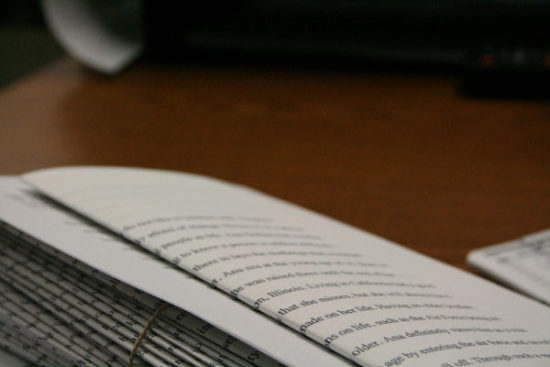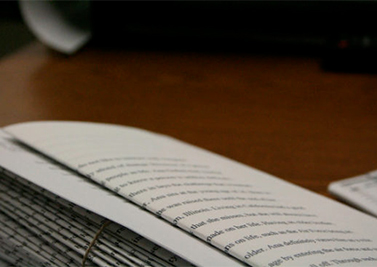
At lunch, a fellow composition instructor and I wondered how to explain to our incoming freshman Trump’s appeal. In his speeches, Trump is so insistent on his claims and so dismissive of facts that he last month he made headlines when he claimed regret for sometimes saying “the wrong thing.”
While it’s tempting to dismiss Trump’s rhetoric as a fluke, his apparent guiding principle—to never be wrong—is hardly unique to American politics, in which speakers must somehow both speak in sound-bite–sized quotes and have perfectly consistent messaging. Further, this insistence on being right is at the heart of American argumentation itself, at least as it is taught in high school.
Every fall at Columbia University, I sit down to a seminar table full of bright, thoughtful freshmen who have somehow come to believe that the goal of a written argument is to win a fight. And why shouldn’t they? They’ve gotten As and high SAT scores writing essays that aim to do just that.
The problem is that these essays are not how professors actually want students to write, let alone how any of us should make a political argument.
So as we launch into the school year, it’s worth asking how the Trumpian goal of winning has infected the American student essay and what we can do about it.
Like many, I blame the five-paragraph essay, which has been drilled into students since homework was chalked onto slates. You probably remember from middle school how they go: To begin, make a debatable statement—this is your thesis and you will put it at the end of paragraph #1. Then, state three reasons why you are right, providing a paragraph of evidence for each. Conclude by restating your thesis, because you were right all along.
Is everything they’ve been taught about writing wrong? How should they write instead?
College professors are not generally fond of the five-paragraph essay and its descendants—essays that, even if more complex, are still driven by a thesis that must be defended at all costs, including civility and really grappling with conflicting evidence. The tone of such an essay is best described by the words of my ninth-grade homeroom teacher: has an attitude problem. David Rosenwasser and Jill Stephen, authors of a widely taught composition textbook, argue that college freshman should move beyond the five-paragraph essay as soon as possible.
My students, when so advised, often feel liberated but confused, if not justifiably betrayed: Is everything they’ve been taught about writing wrong? How should they write instead?
To begin, we need to define an argument as something more than a bombardment of reasons for why we are right. Celebrated rhetorician (it’s a job!) Wayne Booth wrote that rather than writing only “win rhetoric,” aimed to forcibly pull the listener to the speaker’s side, we should try out “listening rhetoric,” which deeply considers another point of view and counterarguments, no matter how disagreeable.
We should also free the essay from its five-paragraph chains. As imagined by French Renaissance philosopher Montaigne, essais were short, witty reflections inspired by everyday life. The French verb essayer means “to try”—a writerly attitude I find inspirational. Rather than trying to fight for some impossible universal truth, it’s enough to explain your own interpretation of a subject, a thinking process often launched by your deep curiosity.
Even in a formal academic essay, with its rigorous analysis of evidence, this is a useful position to try: to begin an argument not from “settled convictions,” as Rosenwasser and Stephen put it, but from uncertainty.
In a logical argument, your conviction must be earned, shaped by the evidence and not the other way around.
In my experience, students with very different writing backgrounds have found this concept helpful, even liberating, because it means their newness to a subject can give them a real advantage: a fresh perspective and curiosity that a subject matter expert might not have.
How do you start an essay with uncertainty? Here’s one idea I give my students: In your introduction, you can pose a question, and then, in your essay body, work your way to a persuasive answer—this is your thesis. In each paragraph, analyze evidence and make a claim that takes you one step forward in your thinking process, leading to your conclusion.
Or keep your thesis in the introduction and argue for it with total conviction. That’s fine too! But explain, if only to yourself, why your thesis was once in doubt. Because in a logical argument, your conviction must be earned, shaped by the evidence and not the other way around.
If you think that starting an essay with uncertainty sounds harder than writing a five-paragraph essay, you are right. So why bother?
In our classes, many of my colleagues and I teach a letter by the poet John Keats, in which he claims Shakespeare’s genius lay in his “negative capability”—in his ability to tolerate “uncertainties, mysteries, doubts, without any irritable reaching after fact and reason.”
It’s in this moment of uncertainty that we can see another point of view, arrive at a new idea, or come to a compromise.
Uncertainty can make us irritable, especially when confronted with assigned essays. We just want to state a thesis and be done with it—or at least that’s how I felt as an undergrad agonizing over essays at three o’clock in the morning.
Still, it’s in this moment of uncertainty that we can see another point of view, arrive at a new idea, or come to a compromise. This perspective is necessary in writing, politics, and college itself, where every discipline is driven by the unknown. To teach this idea about science, Dr. Stuart Firestein, Chair of the Department of Biological Sciences at Columbia University, runs a seminar called “Ignorance” in which he invites a scientist each week to describe his or her field’s many unanswered questions.
In the same way, being a writer has little to do with arguing a claim to the bitter end and everything to do with acknowledging that an argument worth making is full of complications and contradictions—that there are no simple truths.
But then, just as a scientist must test a hypothesis to arrive at new knowledge, a writer must move out of uncertainty, testing her ideas to arrive at a conclusion, working with humility, open-mindedness, and care.
That this is not at all Trump’s way of making an argument might explain its appeal. Perhaps Trump’s remaining fans are not craving tighter immigration laws or a fantasy of 1950s America, but the fantasy of the rhetoric itself–a way of understanding the world that is simple and certain and full of passionate intensity.
This certainty is what people want from political rhetoric generally, argues novelist Zadie Smith in a 2009 essay considering President Obama’s very different rhetoric—intellectual, complex, and multi-voiced. For Smith, Obama’s “negative capability” is in stark contrast to what a recent Shakespearean scholar dubs “ideological heroism”—that is, “the fierce, self-immolating embrace of an idea or institution.” Reluctantly, Smith writes that while Americans might like uncertainty in our writers, we still prefer ideological heroism in our politicians: “We consider pragmatists to be weak. We call men of balance naive fools.”
Indeed, when Trump recently “softened” on immigration, he reportedly lost support. His fiery rhetoric is just what he needs to move the crowds who already agree with him.
But it is decidedly not what makes for an essay that is humanist and inclusive—an essay that leads to illumination.
So this is what I will tell my freshman next week: no matter our politics, Trump’s kind of certainty is precisely the sort we should question in ourselves, starting with every thesis we put to the page.
With thanks to my colleagues at Columbia’s University Writing Program.
